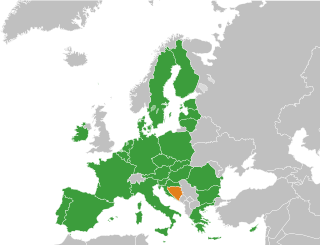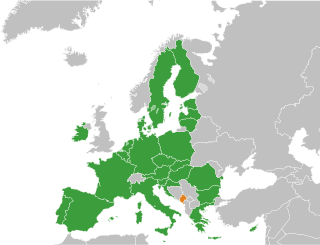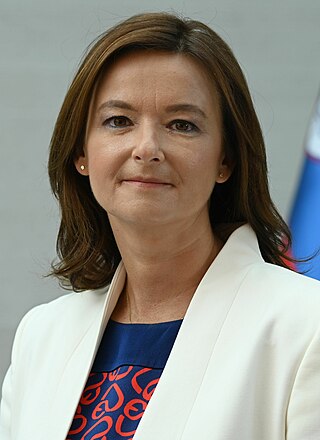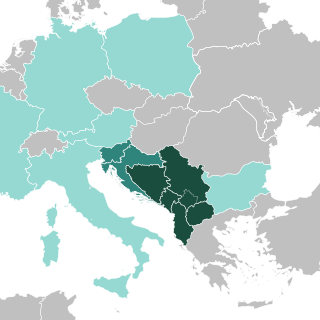
The Balkans, corresponding partially with the Balkan Peninsula, is a geographical area in southeastern Europe with various geographical and historical definitions. The region takes its name from the Balkan Mountains that stretch throughout the whole of Bulgaria. The Balkan Peninsula is bordered by the Adriatic Sea in the northwest, the Ionian Sea in the southwest, the Aegean Sea in the south, the Turkish straits in the east, and the Black Sea in the northeast. The northern border of the peninsula is variously defined. The highest point of the Balkans is Musala, 2,925 metres (9,596 ft), in the Rila mountain range, Bulgaria.

Montenegro is a country in Southeastern Europe, on the Balkan Peninsula. Its 25 municipalities have a total population of 633,158 people in an area of 13,883 km2. It is bordered by Bosnia and Herzegovina to the northwest, Serbia to the northeast, Kosovo to the east, Albania to the southeast, Croatia to the west, and has a coastline along the Adriatic Sea to the southwest. The capital and largest city is Podgorica, while Cetinje is the Old Royal Capital and cultural centre.

The Central European Free Trade Agreement (CEFTA) is an international trade agreement between countries mostly located in Southeastern Europe. Founded by representatives of Poland, Hungary and Czechoslovakia, CEFTA in 2006 expanded to Albania, Bosnia and Herzegovina, Bulgaria, Croatia, Moldova, Montenegro, North Macedonia, Romania, Serbia, Slovenia and Kosovo.

Southeast Europe or Southeastern Europe is a geographical sub-region of Europe, consisting primarily of the region of the Balkans, as well as adjacent regions and archipelagos. There are overlapping and conflicting definitions of the region, due to political, economic, historical, cultural, and geographical considerations.

Albania is on the current agenda for future enlargement of the European Union (EU). It applied for EU membership on 28 April 2009, and has since June 2014 been an official candidate for accession. The Council of the European Union decided in March 2020 to open accession negotiations with Albania.

The accession of Bosnia and Herzegovina to the European Union (EU) is the stated aim of the present relations between the two entities. Bosnia and Herzegovina has been recognised by the European Union as a "candidate country" for accession since the decision of the European Council in 2022 and is on the current agenda for future enlargement of the EU. Bosnia and Herzegovina takes part in the Stabilisation and Association Process and trade relations are regulated by an Interim Agreement.

Accession of Montenegro to the European Union is on the agenda for future enlargement of the EU.

Tonino Picula is a Croatian politician currently serving his fourth term as a Member of the European Parliament for Croatia, having successfully run in 2013, 2014, 2019 and 2024 European elections.

The accession of Albania to NATO took place in 2009. Albania's relationship with the North Atlantic Treaty Organization (NATO) began in 1992 when it joined the North Atlantic Cooperation Council. In 1994, it entered NATO's Partnership for Peace, which began Albania's process of accession into the alliance. In 1999, the country received a Membership Action Plan (MAP). The country received an invitation to join at the 2008 Bucharest Summit and became a full member on April 1, 2009.

Tanja Fajon is a Slovenian politician, former leader of Social Democrats, part of the Party of European Socialists and former Member of the European Parliament (MEP) from Slovenia. She has been serving as the minister of foreign and european affairs in the government of Prime Minister Robert Golob since 1 June 2022.

The 2015 Western Balkans Summit was the second annual summit of heads of states and governments of Western Balkans. It took place in the Vienna, Austria, following the 2014 Conference of Western Balkan States that took place in Berlin, Germany. This summit forms part of the Berlin Process, a five-year process marked by yearly summits in order to underline the commitment to Future enlargement of the European Union towards the Western Balkans region. Official date of summit is 27 of August 2015. After 2014 conference Günther Oettinger confirmed that the event will be organised annually with Vienna as a host city in 2015 and Paris in 2016.

The Berlin Process is an intergovernmental cooperation initiative linked to the future enlargement of the European Union.

The 2019 Western Balkans Summit in Poznań, Poland, was the sixth annual summit within the Berlin Process initiative for European integration of Western Balkans states. Heads of government, foreign ministers, and the ministers of economy from Albania, Bosnia and Herzegovina, Kosovo, North Macedonia, Montenegro, and Serbia attended, as well as two existing EU member states from the region - Croatia and Slovenia. In addition, other EU member states including Austria, France, Germany, and Italy, as well as representatives of the European Union and the International Financial Institutions, attended to the summit.

Gent Cakaj is a Kosovo-born Albanian politician, who served as the Acting Minister of Foreign Affairs of Albania from 2019–2020.

The Brdo-Brijuni Process is an annual multilateral event in the Western Balkans. It was initiated in 2013 by Slovenian president Borut Pahor and Croatian president Ivo Josipović. The first official meeting was in Brdo pri Kranju, Slovenia. The main focus of the Process is the enlargement of the European Union with countries of the Western Balkans. Similar meetings were held at the prime-ministerial level in 2010 and 2011 by then-Prime Ministers of Slovenia and Croatia, Borut Pahor and Jadranka Kosor. The Brdo-Brijuni process includes Slovenia and Croatia and candidates and potential candidates for EU membership from the Western Balkans.

The Open Balkan is an economic and political zone of three member states in the Balkans, those being Albania, North Macedonia and Serbia. The zone has a total area of 131,935 km2 (50,940 sq mi) and an estimated total population of almost 11 million located in Central and Southern Europe. The official languages are Albanian, Macedonian and Serbian. Its administrative centres are the cities of Belgrade, Skopje and Tirana. With the establishment of the zone, all three member states aim to increase trade and cooperation as well as improve bilateral relations.

The Regional Cooperation Council in an intergovernmental organisation established in 2008 to fecilitate cooperation and development in South Eastern Europe. It's secretariat is based in Sarajevo, Bosnia and Herzegovina.

The 2021 Balkan non-papers were two documents of unknown origin, with several sources claiming that they had been drafted by the government of Slovenia, which carried proposals for the redrawing of borders in Southeastern Europe. The first non-paper called for the "peaceful dissolution" of Bosnia and Herzegovina with the annexation of Republika Srpska and great parts of Herzegovina and Central Bosnia into a Greater Serbia and Greater Croatia, leaving a small Bosniak state in what is central and western Bosnia, as well as the unification of Albania and Kosovo. The story about the first non-paper was first published by Bosnian web portal politicki.ba on 12 April 2021. The existence of the first non-paper was initially disputed, with Albanian prime minister Edi Rama being one of the few to claim to have been shown it. The Slovenian website Necenzurirano published the alleged non-paper on 15 April 2021.
The Western Balkans Quad is an initiative launched in March 2023 by four Western Balkan countries, Albania, Kosovo, Montenegro and North Macedonia, to support policy alignment with the European Union's Common Foreign and Security Policy.

The 2022 EU–Western Balkans summit was the fourth edition of the European Union–Western Balkans summit held on 6 December 2022 in Tirana, Albania. Hosted by the Albanian Prime Minister, Edi Rama, the summit brought together heads of state and government from the Western Balkan nations, including Bosnia and Herzegovina, Kosovo, Montenegro, North Macedonia, and Serbia, alongside other EU representatives. Amid the setting of the ongoing Russo-Ukrainian War, it underscored the union's commitment to strengthening its political, economic, and security cooperation with the region. Among the central themes of the discussions was the union's support for the region's integration, particularly through the alignment of the Western Balkans with EU standards. The Tirana Declaration, one of the summit's key results, reaffirmed the EU's dedication to the region's EU accession process, while highlighting the demand for political and institutional reforms and democratic principles.























